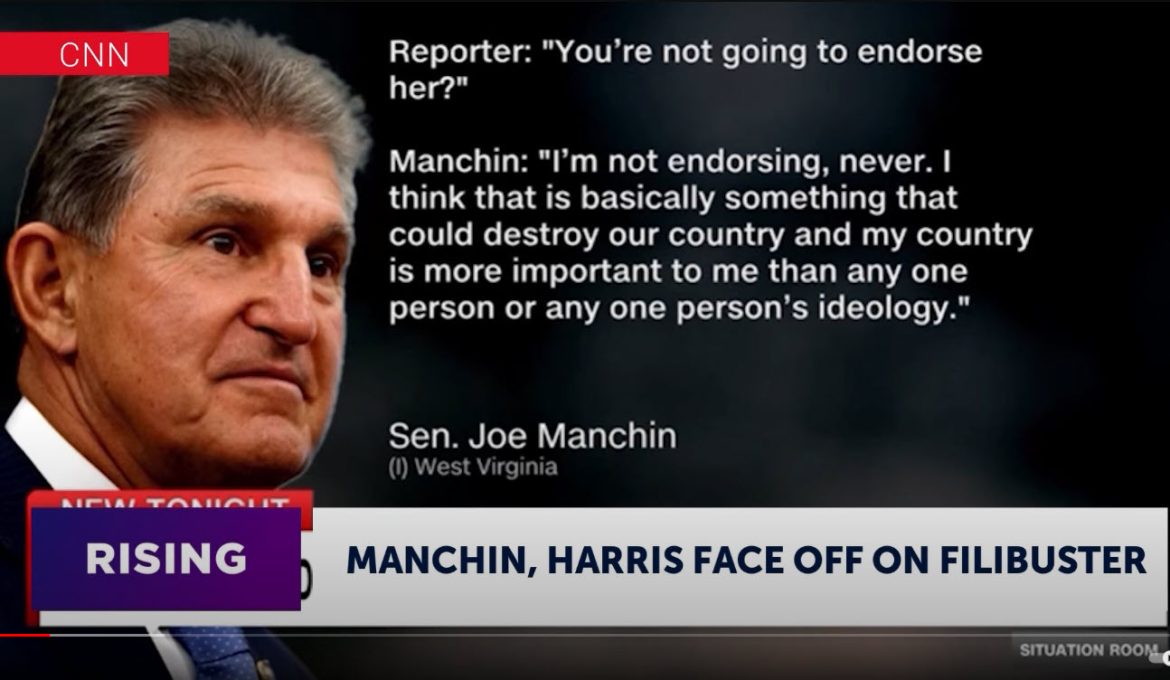Independent Senator Joe Manchin of West Virginia has made it clear that he will not endorse Vice President Kamala Harris for any future presidential run, citing her stance on gutting the Senate’s filibuster rule. Manchin’s refusal follows Harris’ recent declaration that she would seek to abolish the filibuster if necessary to pass legislation codifying abortion rights into federal law, a move that Manchin fiercely opposes.
In an interview with CNN earlier this week, Manchin expressed his disapproval of Harris’ position, saying, “Shame on her. She knows the filibuster is the Holy Grail of democracy.” The West Virginia senator, who is known for his moderate stance and defense of the filibuster, warned that eliminating the rule would do irreparable damage to the integrity of the Senate and diminish its role as a deliberative body.
Manchin’s Defense of the Filibuster
The filibuster, which requires 60 votes to advance most legislation in the Senate, has long been a contentious issue in U.S. politics. Critics argue that it allows a minority of senators to block essential legislation, while proponents, like Manchin, believe it is a critical tool for ensuring bipartisanship and protecting minority rights in the legislative process.
For Manchin, the filibuster is non-negotiable. “The filibuster is what makes the Senate different from the House. Without it, you lose the entire purpose of the Senate as a place for extended debate and compromise,” he said. Manchin has repeatedly resisted calls from progressive Democrats to abolish the filibuster, despite increasing pressure from within his own party, particularly on issues such as voting rights and reproductive rights.
Harris’ Push for Abortion Rights
Vice President Harris’ comments about the filibuster came as part of a broader discussion on protecting abortion access in the wake of the Supreme Court’s decision to overturn Roe v. Wade. In a recent interview, Harris reiterated her commitment to advancing federal legislation that would restore abortion rights nationwide, even if it meant bypassing the filibuster to get it done.
“I will not sit idly by while women’s reproductive rights are stripped away,” Harris said. “If it takes changing Senate rules to protect those rights, then that’s what we need to do.”
Harris’ position has resonated with many Democrats and progressive advocates who see the filibuster as an obstacle to enacting critical reforms, especially in light of increasingly partisan gridlock in Washington. However, for centrists like Manchin, this stance represents a direct challenge to the foundational principles of Senate governance.
Political Fallout and Divisions
Manchin’s refusal to endorse Harris highlights deepening divisions within the Democratic Party over the future of the filibuster and other key legislative strategies. As a self-described centrist, Manchin has often clashed with the more progressive wing of the party, particularly on issues such as climate change, healthcare, and now, reproductive rights.
His opposition to changing Senate rules may also reflect his political reality in West Virginia, a deeply conservative state where his independent standing allows him to navigate complex partisan dynamics. While Manchin has maintained his independence from both parties, his stance on issues like the filibuster continues to set him apart from the Democratic leadership.
On the other hand, Harris, a former U.S. senator herself, has made clear that she views abolishing the filibuster as a necessary step to achieving meaningful progress on key Democratic priorities. Her stance is likely to fuel further debate among Democrats about the future of the filibuster, especially as the 2024 election approaches.
A Sign of Future Political Battles?
Manchin’s refusal to back Harris could signal larger challenges for the Democratic Party as it seeks to unify ahead of future elections. The ongoing debate over the filibuster, reproductive rights, and other hot-button issues may continue to deepen fissures between moderates and progressives within the party.
Meanwhile, political observers are watching closely to see how this dispute might impact both Manchin and Harris’ future political ambitions. Manchin, who recently declared himself an Independent, is rumored to be weighing his own potential presidential bid, although he has not made any official announcements. Harris, for her part, is seen as a likely contender for the Democratic nomination should President Biden choose not to run for re-election.
As both figures navigate their political futures, their opposing views on the filibuster reflect the broader ideological battles playing out within the Democratic Party — battles that could shape the direction of American politics for years to come.



